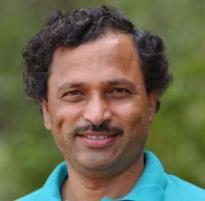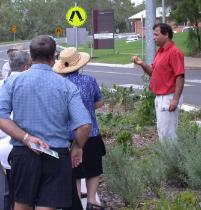Plant guru to help Indians bring land back to life
Published on 26 February, 2008
CQU's Dr Nanjappa Ashwath is among only 20 candidates in the world to gain a Rotary Teaching Scholarship for 2008* .
The scholarship will enable a 3-month tour of India (from Nov 08 to Jan 09) to show how Australian plants can help remediate degraded land and produce essential requirements of life such as animal feed and fuel wood.

Dr Ashwath's project has gained support from Rotarians John Lamb, Dawn Hay and Rakesh Gupta and CQU academics Professor David Midmore, Professor Kerry Walsh and Professor Elizabeth Taylor.
Mr Lamb said previous Australian winners of the Rotary Teaching Scholarships had gone on to become world leaders in their field.
"Dr Ashwath's work can be of huge benefit to many parts of the world and he is an asset to Australia and Queensland in particular," he said.
Dr Ashwath said his work with Australian native plants over the past 25 years had identified a large number of species well suited to growing on degraded lands throughout India.
"I'll be delivering lectures on how native plants grow in harsh environments of Australia, and what products they can offer to the community including fuel wood, fodder, timber, biodiesel and medicine," he said.
"I hope to create an interest amongst policy makers, researchers and the practitioners
"I am very excited with this opportunity as this will not only help promote native species, but will also help apply the knowledge we have gained over decades in problem solving."
Dr Ashwath said his current projects included trials of native plants in 5 different states to test their 'biopumping' capacity in connection with landfill phytocapping (coverage of landfills by vegetation).He said he had established more than 100 species on a railway corridor near the Queensland town of Banana to test their ability to stabilise rail track.
About 50 species were established at Gladstone and at a crocodile farm in connection with the restoration of mangrove habitats, and another 100 species on landfills at Rockhampton, Noosa and Brisbane.
"We recently initiated studies on biodiesel potential of native plants. This would help identify suitable species for biodiesel production, so that one day farmers can grow native biodiesel plants on their land and generate their own biofuel without relying upon fossil fuel."
* Higher-education faculty can teach abroad through Rotary Grants for University Teachers. The program builds international understanding and fosters development while strengthening higher education in low-income countries. It also aims to establish ties between higher-education institutions, leading to the exchange of ideas and information worldwide. Grant recipients must teach subjects relevant to the local population's needs and contribute to the area's socioeconomic development.

Dr Nanjappa Ashwath is renowned for educating about native plants

